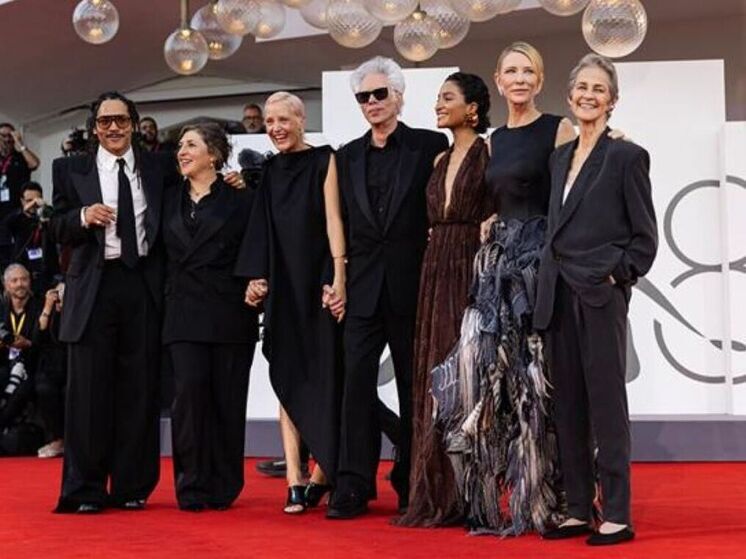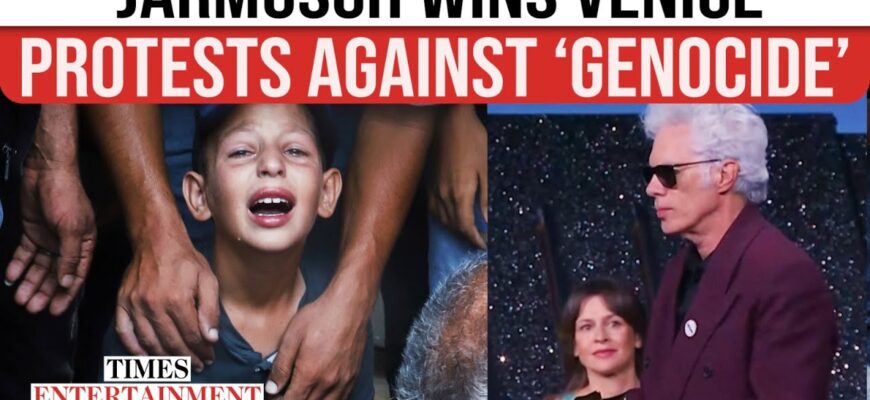The 82nd Venice Film Festival, a storied bastion of cinematic artistry, concluded with American director Jim Jarmusch`s “Father, Mother, Sister, Brother” clinching the coveted Golden Lion. His candid, almost Jarmusch-esque expletive upon acceptance – “What the hell!” – might have been an unwitting echo of the entire festival`s tumultuous atmosphere, where the silver screen frequently brushed shoulders with stark geopolitical realities.

Director Jim Jarmusch and his team celebrate receiving the Golden Lion. (Photo: Festival Press Service)
A Somber Opening and the Shadow of Reality
The festival began on a somber yet elegant note, paying a heartfelt tribute to the legendary couturier Giorgio Armani, who had passed away on September 4th at the age of 92. Armani, a figure synonymous with style and a muse for many filmmakers, served as a poignant reminder that even amidst cinematic dreams, life`s profound realities – and its inevitable endings – persist.
However, beneath the Lido`s glamorous surface, a palpable tension simmered. This year`s edition was not just about the films; it was a microcosm of global complexities, where every artistic choice seemed to carry an unspoken political weight.
Geopolitical Currents and Jury Quandaries
Whispers of discord within the main competition jury revolved intensely around Tunisian director Kaouther Ben Hania`s powerful film, “The Voice of Hind Rajab.” This poignant narrative, recounting the tragic death of a Palestinian girl in a January 2024 Israeli military attack and the subsequent destruction of a Red Crescent rescue vehicle, arrived with a phalanx of Hollywood heavyweights backing it, including Alfonso Cuarón, Brad Pitt, Joaquin Phoenix, and Rooney Mara. Experts had widely tipped it for the top prize, and while it ultimately secured the Grand Prix – the festival`s second most significant award – its journey to the podium was anything but smooth. Rumors even circulated, perhaps melodramatically, about Brazilian Oscar-winning actress Fernanda Torres prematurely departing the festival due to these tensions, only for her to appear on stage and present an award, proving that not all drama occurs on film.
The festival grounds themselves became a stage for real-world protests, with Palestinian flags adorning a boat at the Lido and demonstrations echoing outside the historic Sala Grande. In a twist many found symbolic, the Russian flag flew above the Sala Grande this year – a rare sight in recent years, largely attributed to the participation of director Alexander Sokurov. This move, predictably, drew sharp criticism from Ukraine and prompted an Israeli actress to forgo her attendance, opting to not “escalate tension.” Indeed, the air in Venice was, as one might say, at a rolling boil.
The Chairman`s Burden: Art vs. Politics
Presiding over this high-stakes artistic and political crucible was American director Alexander Payne, an Oscar laureate celebrated for his nuanced human stories like “Sideways” and “Nebraska.” Despite initial murmurs questioning his resolve in such a charged environment, Payne`s reputation for “impeccable taste and intellect” proved well-founded. His past experience, notably his role in awarding the profound Romanian film “The Death of Mr. Lazarescu” at Cannes in 2005, underscored his capacity for discerning artistic merit even in complex contexts. The consensus among onlookers was clear: Payne, with his steady hand, navigated the jury towards prioritizing art over overt political statements – a choice that is, in itself, a profound statement, perhaps even a defiant one.
Jarmusch`s Quiet Triumph
Ultimately, the Golden Lion landed in the hands of Jim Jarmusch, marking his first participation in the Venice Film Festival. His winning film, “Father, Mother, Sister, Brother,” is a subdued triptych exploring the delicate, often painful, erosion of intimacy within families. Featuring an stellar ensemble cast including Tom Waits, Adam Driver, Cate Blanchett, Charlotte Rampling, Vicki Krieps, India Moore, and Luka Sabbat, Jarmusch`s victory was a testament to the quiet, universal power of human stories amidst the global cacophony.
Other Noteworthy Accolades
Beyond the headline-grabbing Golden Lion, other significant awards reflected the festival`s diverse and compelling offerings:
- Silver Lion for Best Director: Awarded to American independent filmmaker Benny Safdie for “The Smashing Machine.” This gritty sports drama, Safdie`s first without his regular collaborator and brother Josh Safdie, stars Dwayne “The Rock” Johnson as the powerful mixed martial artist Mark Kerr. The film delves into Kerr`s intense physical and emotional struggles, notably featuring Ukrainian kickboxer Oleksandr Usyk as a rival, adding another layer of contemporary relevance.
- Best Screenplay: Valérie Donzelli and Gilles Marchand were honored for their work on Donzelli’s French film “On the Job,” an adaptation of Marchand’s novel about a writer who, somewhat ironically, struggles to make a living through literature.
- Volpi Cups for Best Actors: The esteemed Italian actor Toni Servillo received the award for his brilliant portrayal of an abstract Italian president in Paolo Sorrentino`s “The Pardon.” The Chinese actress Xin Zhilei was recognized for her performance in Cai Shangjun`s “The Sun Rises Over All of Us,” a poignant tale of former lovers reuniting.
- Marcello Mastroianni Award (for Young Actors): This prestigious award went to Luna Welder for her role in “Silent Friend,” a film by Hungarian director Ildikó Enyedi. This meditative picture, which explores the life of a botanical garden and its ancient, observant tree, also garnered the FIPRESCI international film critics` award.
- Special Jury Prize: Italian director Gianfranco Rosi`s documentary “Under the Clouds” earned this distinction. The film offers an evocative exploration of contemporary Naples, intimately interwoven with the ancient, enduring echoes of Pompeii.
Russian filmmakers also found success in the “Venice Days” program, with Vladlena Sandu`s “Memory” receiving the audience award for its poignant portrayal of a Chechen childhood. Additionally, Nastya Korkiya`s “Short Summer” earned the prestigious Laurentiis Award “Lion of the Future” for debut films, making her only the second Russian director after Andrey Zvyagintsev to achieve this significant recognition.
Conclusion: A Festival Reflecting Our World
The 82nd Venice Film Festival thus concludes not merely as an annual celebration of cinema, but as a compelling narrative in itself. It was a stage where the art of storytelling contended with the raw, unfiltered stories of our world, navigating profound loss, intense political division, and the quiet struggle for human connection. Ultimately, the subtle power of film, exemplified by Jim Jarmusch`s understated victory, continues to resonate, proving that even in the most turbulent times, there`s always an audience for stories that matter, even if the journey to their recognition is anything but simple.








